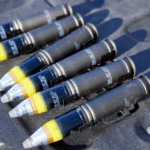
President Donald Trump on Friday declared a national emergency allowing his administration to use billions of dollars towards constructing a wall along the southern border, including $6 billion in funds from the Pentagon’s military construction and drug interdiction accounts. A senior White House official told reporters the $8 billion accrued for the border wall is broken up between $1.375 billion included in a spending bill the president signed Friday, $3.6 billion from DoD’s military construction budget, approximately $2.5 billion pulled…

 By
By 











